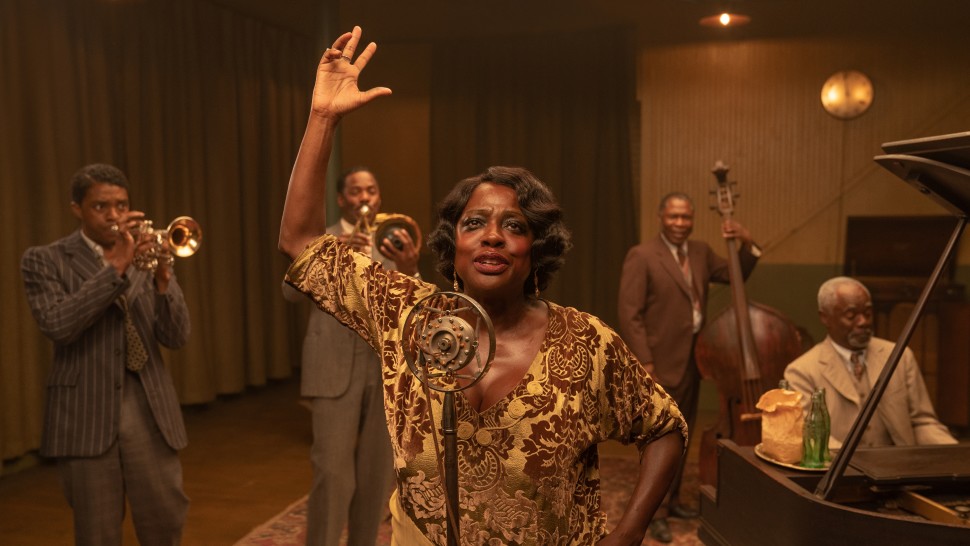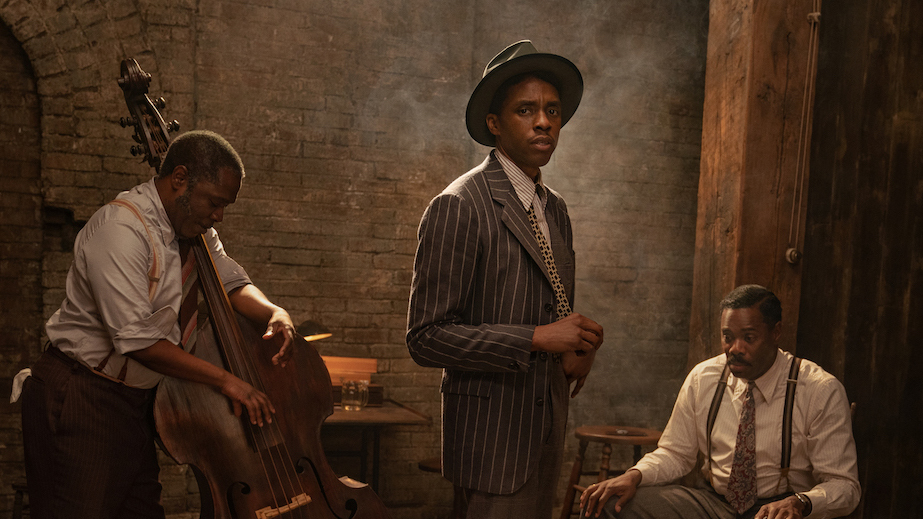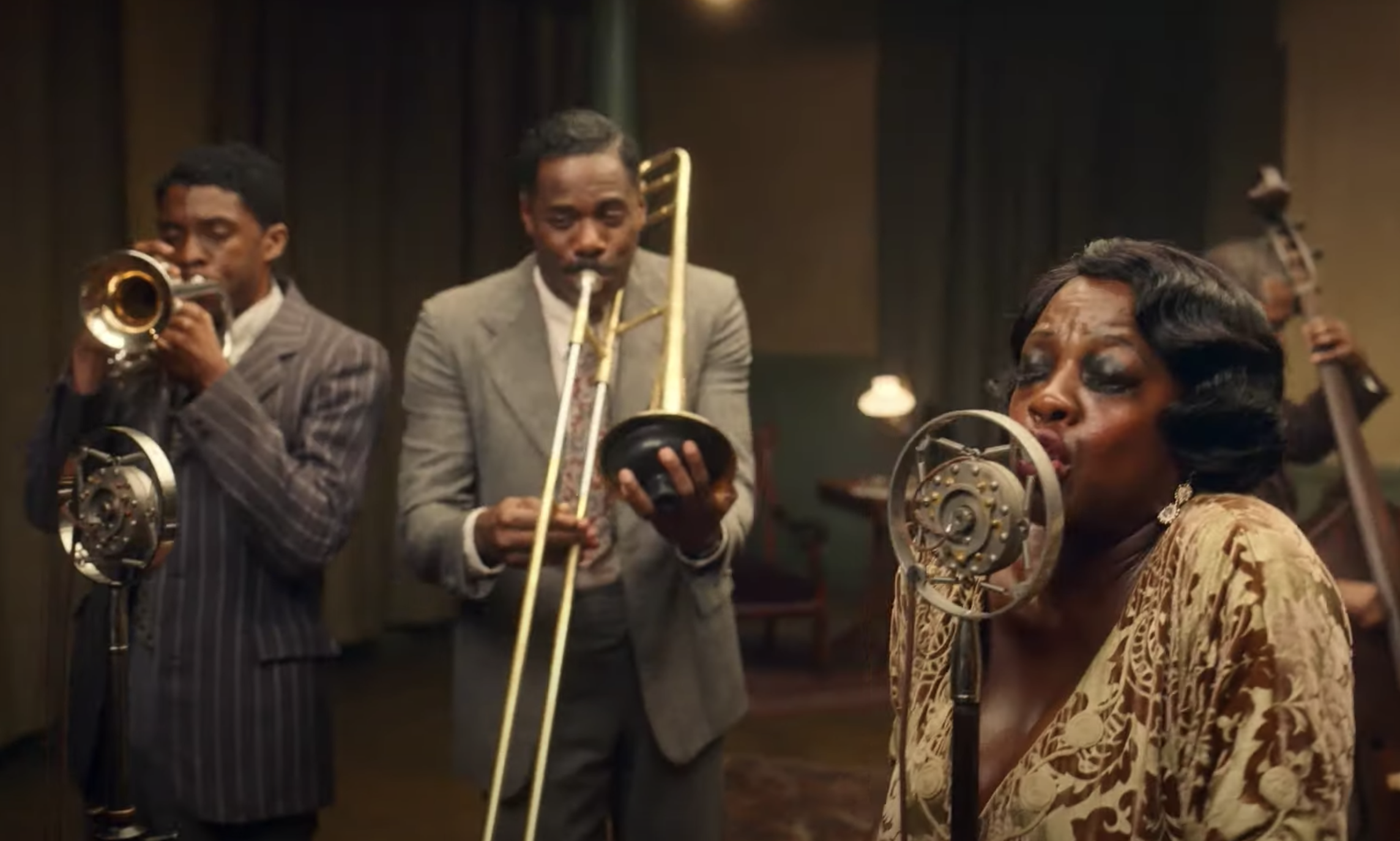 By Jacob Sahms
By Jacob Sahms
“The Mother of Blues” Ma Rainey (1886-1939) sang blues professionally, beginning in 1923, with songs like “Moonshine Blues,” “See See Rider Blues,” and “Soon This Morning.” She also delivered the titular “Ma Rainey’s Black Bottom” song of Netflix’s adaptation of the August Wilson stage play, the final film of Chadwick Boseman’s illustrious, gone-to-soon career. Alongside Viola Davis’ Rainey, Boseman plays Levee as a young black blues musician with ambitions of his own who crashes into the established expectations of black music and culture.
With no experience of the stage version, one can see the dynamics played out as between the poles of Davis’ Rainey and Boseman’s Levee. The first represents the old way of doing the blues, with a desire to keep control of the sounds, the feels, and the delivery. The second represents “working the system” to take blues somewhere new, and fresh, and different, even if it means abiding by the standardized way that a person of color was negotiating life with a white person. Watching, one can see the strengths and weaknesses of each argument, but the music was the common denominator between the two sides.
 Watching Boseman work the scenes as Levee is a reminder of what the world lost when he died of colon cancer, what power some actors and musicians possess in a way to make a difference in the stories they show us. His heartbreaking scenes are emotional, incredibly-charged, especially as he shares the story of Levee’s father and mother, and the terrible wound that Levee carries in his heart and on his body.
Watching Boseman work the scenes as Levee is a reminder of what the world lost when he died of colon cancer, what power some actors and musicians possess in a way to make a difference in the stories they show us. His heartbreaking scenes are emotional, incredibly-charged, especially as he shares the story of Levee’s father and mother, and the terrible wound that Levee carries in his heart and on his body.
It’s no wonder that Levee and Cutler (Colman Domingo) come to blows later, when the religious Cutler takes umbrage at Levee’s denunciation of God. Cutler doesn’t understand the deep pain that Levee carries, which ultimately erupts from the place it has been welled up so long. It’s a profane rant that Levee unleashes from a place of deep darkness and hurt, that works as a Psalm-like epithet thrown up at God by someone who has seen the darkness in humanity’s heart and felt the brunt of its worst blows.
The film is a verbal assault, the way that the men in the band (and the women, too) rail against each other. They all want to get ahead, but they’ve made various deals along the way to get to where they are and are worried about getting theirs, too. Ultimately the language of violence and the being held down by the established white producers builds up to an explosion of sorts, with devastating ramifications. In the end, that’s all but forgotten, as a white band performs Levee’s music, while he has nothing to show for it. This is a parable of black rage and incredible hurt, done by whites to people of color and by people of color to other people of color.
 There’s social justice ingrained in all of this, a story of the tragic struggle of black musicians, but there’s also a set of lessons for all of us. What we say matters, and how we respond counts (for good or bad). Who we hurt “on the way up” impacts our path, and we’ll all be held accountable for that.
There’s social justice ingrained in all of this, a story of the tragic struggle of black musicians, but there’s also a set of lessons for all of us. What we say matters, and how we respond counts (for good or bad). Who we hurt “on the way up” impacts our path, and we’ll all be held accountable for that.
In the end of the Parable of the Sheep and the Goats in Matthew 25, when the sheep and the goats were evaluated by the king, some never saw the people they helped and served, while others were rejecting for failing to ever love the king. The epic rise (and fall) contained within Wilson’s play and George C. Wolfe’s film warn us all about the means by which we’ll be measured – they’re the ones we used on and with others along the way.
Ma Rainey’s Black Bottom releases in theaters on November 25 and on Netflix on December 18.
The film contains prevalent strong language including racial slurs and some violence.




